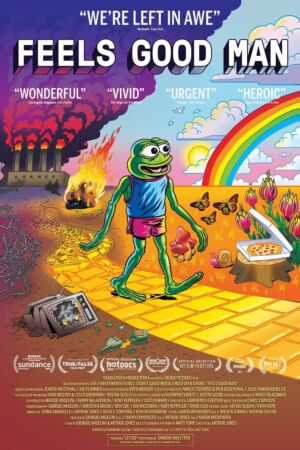Feels Good Man: The Key to Counteracting Polarization
By Josh Thompson
At what point does internet humor turn into political extremism? The film Feels Good Man directed by Arthur Jones pursues this question as it explores the rise of one of the most popular memes of all time, Pepe the frog, as well as its eventual decay into becoming a recognized hate symbol by the Anti-Defamation League (ADL). The documentary serves as an example of the dangers of internet exposure and the radicalization of the current political climate.

The film follows Matt Furie and his journey through life starting from his college years in the nineties and up until 2019, most notably, his creation of Pepe the frog, originally a character in a comic book series and its eventual development into an internet meme. Along the way, we are introduced to various internet philosophers and scholarly speakers who lend their perspectives on the subject matter. These personalities range from psychologists to magic users, all with important contributions to the story. As Pepe evolves throughout the internet and begins his deterioration into an alt-right icon, the film personifies the internet legend to embody what both Furie and the audience feel. Let me tell you, it feels bad man.
Subsequently, the film is incredibly effective in its storytelling as well as its presentation of the people involved in the narrative. Furie was a charismatic protagonist throughout the entirety of the film, from his humble beginnings working in a thrift store to his riveting legal battle with InfoWars’ Alex Jones, I constantly found myself rooting for Matt’s success. Concurrently, the animation throughout the film was remarkably charming, constantly engaging my eye as well as propelling the narrative further in an interesting and unique way. One sequence that stood out to me was the discussion on the birthplace of the word “meme” and the origins of its original definition. The subsection captured my attention and showed how Pepe had evolved as it exponentially spread throughout the internet.
Moving on, the message of the film was an incredible one. Throughout the emotional roller coaster of its duration, I found myself at its finale in awe and thoroughly changed for the better, a feat rarely accomplished by any piece of media these days. I find that it is an important watch to educate the public on the dangers of radicalization and the use of satirical humor. Being familiar with the meme long before the documentary came out, I half expected the documentarians to sound like complete outsiders in regard to the culture.
However, the people being interviewed seemed knowledgeable on the subject matter and brought something new to the table that I was unaware of. Specifically, in regards to the 4Chan user’s segments in the film I was shocked to see an entirely new side to the internet I was blissfully unaware of. Yet, what conversation about a film is complete without a discussion of what the film doesn’t accomplish? This documentary does not drastically break away from the cliches of the genre. However, with that being said not every documentary can have the same ingenuity as an Erol Morris film, but with a deep and compelling story, why reinvent the wheel? It is remarkable what Arthur Jones and his team were able to create, given that it is his directorial debut and he had such a huge hand in creating this film.
Now, how does this all culminate into the counteracting of political polarization in the United States? Well, this film offers a unique insight into the culture of 4chan and the radicals who participate in its message boards that need to be recognized. In an interview with Filmmaker Magazine, Jones elaborates “We didn’t want to lazily cut to a journalist explaining 4chan to you. In
order to understand 4chan, you needed to hear it from someone who really cared about Pepe as a character and felt that the role/connection to the character was a part of them, representing a personal symbol of their culture. (Luers, 2020)” – Pepe for the 4chan culture extended beyond a silly meme, rather it was a way in order to communicate emotions that they have never felt comfortable expressing in person. When it was adopted by people who were outside of the culture, the population felt as though they were being attacked and ridiculed by the people they already felt scrutinized by in real-world social sects. However true this narrative is, what matters is it feels real to the people who peddle it, disempowered men who are looking (even if not actively) for ways to process their emotions.

The sad reality is that everyone’s beliefs are becoming more radicalized and polarized as we progress through this digital age losing that common middle ground our society very much needs. According to Pew Research, there is less overlap between party’s philosophies in 2017 than there was in 1994 (Pew Research, 2018). On this trajectory, the moderate party of political thought will be dissolved leaving our country in a massive state of disarray. However, during one point of the film, John Michael Greer discusses that there is a message behind each phenomenon that needs to be heard before it fizzles out into history. In order to counteract this political radicalization, we need to find healthy ways for disempowered men to vocalize their frustrations. We can no longer afford the alternative, of lost people finding dangerous message boards and being swept up into something they never would have been involved with otherwise.
This film is a powerful documentary that captures an amazing story in that of Matt Furie. As well, the team who created this film deserves the utmost praise for the work they were able to accomplish. It is one of the most important pieces of media to come out of the genre in the past decade and it can make an incredible impact on the world, not just by outlining the dangers of the internet but by also revealing how your actions online can lead to some real world consequences.

